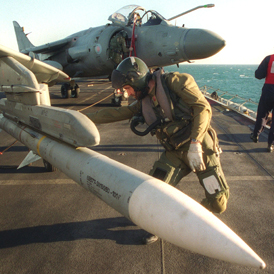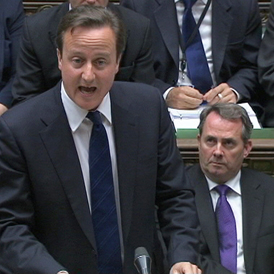Libya conflict could have cost less without defence cuts
Liam Fox tells Channel 4 News “we have the capability to project air power abroad and protect UK interests at very short notice” as questions are raised over the cost of the Libya airstrikes.

David Cameron is believed to be considering a re-assessment of defence cuts hitting both equipment and manpower.
The prime minister has already forced the Treasury to underwrite the Ministry of Defence over the £800m overspend on its 2011-2012 budget.
The PM previously reassured the Commons on 23 March: “Obviously we will look very closely at all the lessons we should learn from what we are engaged in – diplomatically; politically; and in terms of both foreign policy and military equipment.
“What I would say, though, is that the whole predication of the strategic defence and security review was that we should be able to deploy at speed anywhere in the world and have very flexible armed forces, with particular emphasis on transport and on things such as special forces.
“We think that we did anticipate the sorts of things we are doing now, but if there are further lessons to learn, of course we should learn them.”
Defence Secretary Liam Fox has told Channel 4 News: As the ongoing operation is proving we have the capability to project air power abroad and protect our nation’s interests at very short notice. Our extensive basing and over-flight rights mean that we do not need to rely on an aircraft carrier.”
Calls for Defence Review to be re-assessed
The lessons look like they may soon have to be learnt from. Defence experts in the Lords have been long arguing that a re-assessment of the SDSR take place, in open discussions with peers. Lord West, former First Sea Lord, told Channel 4 News: “The Government needs to run a rule over the SDSR because of the recent strategic shocks, the biggest one the events in Algeria right across to Oman”.
Lord Stirrup, former chief of defence, warned peers last week that the armed forces are a “finite resource and ever more finite by the month” as well as warning of the “severe consequences” if another conflict arose that was very definitely in the British national interest, earmarking a possible “miscalculation in the Gulf” from Iran.
Shadow Defence Secretary Jim Murphy said: “If this is a genuine reopening of the SDSR it can be welcomed but I worry its more about politics than defence. The Government has made some peculiar decisions on defence. For example we have aircraft carriers without any aircraft.”
Mr Murphy went on to explain the cuts had been too reactionary: “While the deficit is temporary, the cuts are permanent, these capabilities will not come back. The big decision is how quickly do you cut the deficit, and the Government, cheered on by the Liberal Democrats, in my opinion, have done this too quickly.”
Earlier in the week NATO called for more air power from the British after the UK committed a further four Tornados to the conflict in Libya. “Britain has stepped up to the mark with four Tornados but will have to do more,” a NATO official said. Such demands could go some way, for example, to saving the plight of a squadron of 12 GR4 Tornados, the Nimrod spy planes and even the Harrier jump jets decommissioned last October.

Libya costs escalating
Channel 4 News has been handed new figures alleging huge military spending needed to maintain the demands on the UK Armed Forces in the Libya conflict that could have been averted if certain measures outlined in the SDSR had not been actioned.
The Navy Campaign, who argue against the decommissioning of naval vessels and equipment, notably the HMS Ark Royal and Harrier jump jets, have shared figures that indicate the cost of current air operations for Libya out of Gioia, Italy, is costing the same in three weeks as it would have cost to maintain an aircraft carrier for a year.
Their spokesperson Bethany Torvell has obtained information alleging the operational cost of British presence at Gioia is at £30m per week including nightly hotel bills of £40,000 for personnel.
She said: “The cost of the decisions from the SDSR are now becoming nakedly apparent – despite some very enthusiastic PR efforts to disguise them – and it defies logic. Given that the defence cuts were justified because the country didn’t have enough money, how are we now spending £30m a week running operations from Gioia?
“One month of this operation is enough to keep a carrier and Harriers in service for a year. The only additional cost when deploying a carrier is the ammunition you use – which would be just as effective and an awful lot cheaper. Where’s the fiscal stringency now?”
If these figures are accurate, and the conflict continues well into the summer as predicted by RAF Chief Sir Stephen Dalton last week, the cost of the Libya conflict could run into hundreds of millions of pounds.
In addition, Ms Torvell was informed that British air response from Gioia to Libya was operating at around 45 minutes, comparable to the US who were flying from naval ships, who had operated at fifteen minutes from deck to target before drawing down their aerial contribution.
Defence Secretary Dr Liam Fox told Channel 4 News that allegations measures as a result of the SDSR had actually resulted in further expense to the military was not true and in fact the review was designed with conflicts like Libya in mind.
He said: “Operations in Libya will be funded by the Treasury Reserve and we cannot confirm the total cost at this stage. The Strategic Defence and Security Review was developed to give our Armed Forces an adaptive posture which gives us greater flexibility, enabling us to react to the challenges of today. As the ongoing operation is proving we have the capability to project air power abroad and protect our nation’s interests at very short notice. Our extensive basing and over-flight rights mean that we do not need to rely on an aircraft carrier.”